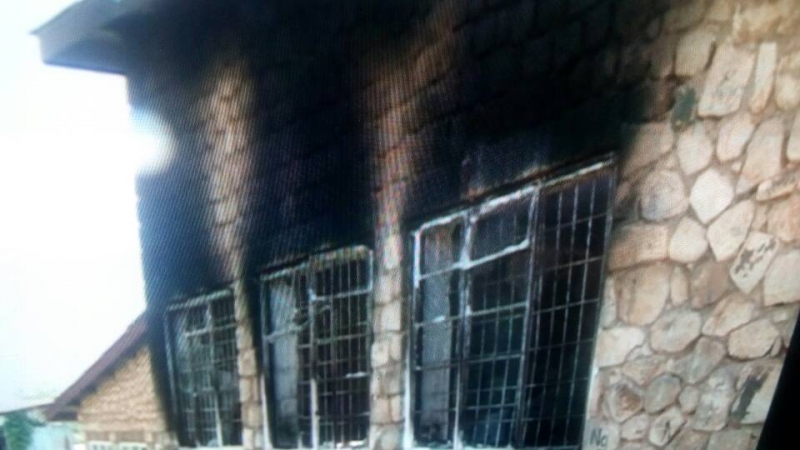Southern Cameroons Crisis: Church schools targeted in Ambazonia
Schoolchildren are deliberately attacked, abducted and killed in Cameroon’s increasingly violent Anglophone crisis. An independent investigation has verified 13 recent attacks using satellite images, finding both government soldiers and armed separatist groups responsible. Catholic and Presbyterian-run institutions are among the schools targeted by all sides in the conflict. It is thought that two hundred schools have been attacked or set on fire since 2018.
In 2016, the Francophone-dominated government of President Paul Biya tried to impose a French curriculum on English-speaking schools, while demanding that the French legal system replaced English Common Law in courts in the Anglophone regions of North West and South West.
In response, armed groups demanding an independent Anglophone nation called Ambazonia called for a boycott of schools and a weekly “ghost towns” that shuttered the economy. A warning from the Ambazonian Restoration Forces appeared on Facebook in August 2019, telling parents not to send their children to school, saying, “You will have only yourselves to blame.”
After the attacks began, parents withdrew their children, forcing education in the Anglophone regions to cease. The UN estimates that one million youngsters (out of a total Anglophone population of six million adults and children) have been out of school for almost four years. The Cameroon ministry of basic and secondary education recently announced that 70,000 children have now returned and 400 schools have reopened. However, it is understood that those schools are in towns and cities, whereas institutions in more remote areas are reluctant to reopen for fear of attack.
The Bellingcat report draws on years of research by the Cameroon Anglophone Database of Atrocities, working with the Berkeley Human Rights Center. Many of the attacks have taken place in the diocese of Bamenda which is twinned with the UK diocese of Portsmouth. St Augustine’s Secondary College in Kumbo was attacked in May 2020; in October 2020, men on motorcycles armed with machetes and guns killed seven children and wounded a dozen at Mother Francisca International Bilingual Academy in Kumba; and in January 2021, the Presbyterian secondary school in Mankon, Bamenda was torched.
A Presbyteran school in Nkwen near Bamenda was subject to two attacks in 2018 during which almost 100 teachers and children were abducted, interrogated and held for ransom. They were eventually released unharmed. In November 2020, the students and teachers at Kulu memorial College were forced to strip and then run into the bush before the building was burned. In the North West region, the wing of a Catholic school in Kambe was burned in February 2021.
Bellingcat is an independent international collective of researchers, investigators and citizen journalists. It’s report, “How Schoolchildren became Pawns in Cameroon’s Anglophone Crisis,” is based on painstaking work by volunteers at the Cameroon Anglophone Crisis Database of Atrocities and the Berkeley Human Rights Center, videos posted on social media by civilians, soldiers and armed groups, and opensource material and satellite imagery.
The Bellingcat report quotes teachers who “walk a thin line” between the armed separatists enforcing the boycott and the government security services which are trying to end the ban. In addition, teachers say they are targeted by criminal gangs extorting money. The Voice of America quotes Nji Samuel Kale of the Presbyterian Church in Cameroon, saying, “The community and the Christians help us run the schools. The teachers, we must attest, they have been enduring a lot. They have shown a lot of resilience.”
Most of the separatist leaders live overseas, meaning that their children are not missing school. They refuse to back down unless they are seen to win concessions from the government. Meanwhile the Swiss Centre for Humanitarian Dialogue continues to offer to host inclusive peace talks. Both the government and armed separatist groups have declined to participate.
Before he died earlier this year, Cardinal Christian Tumi warned that violently enforcing the schools boycott was turning the Anglophone population against the separatists. He mentioned a girl whose hand was amputated by separatists as she went to sit her exams. Cardinal Tumi was kidnapped and interrogated by an armed Anglophone group in November 2020. He was later released unharmed but died in April 2021, age 90.
Historically, the Catholic Church, as well as Anglican and Presbyterian missions, have run schools and clinics across Africa in the absence of comprehensive, good quality education and health provision by governments. In addition, faith-based entities are estimated to provide between 30% and 70% of health services. There are no reliable figures for how many schools are provided by faith groups on the continent.
Source: Independent Catholic News





